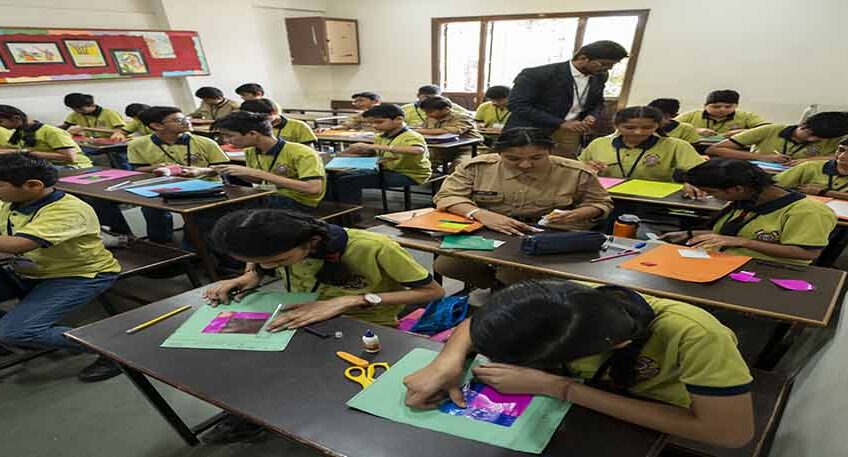
Students might profit from attending Central Board of Secondary Education (CBSE) institutions in a number of ways. The uniform curriculum and evaluation methods that CBSE schools use are a major benefit. The board makes sure that all connected schools follow the same syllabus, which can be quite helpful for pupils who might need to move for a variety of reasons. Because of this regularity, children can shift more easily and have less stress when adjusting to new learning situations. Furthermore, by emphasising a well-structured curriculum with a focus on science, maths, and language skills, CBSE improves students’ academic and career prospects by efficiently preparing them for competitive exams and higher education.
Moreover, CBSE schools frequently place a high priority on a comprehensive approach to education, combining academic study with co-curricular activities and the development of life skills. Students benefit from a well-rounded education that fosters the development of their social, emotional, physical, and intellectual faculties. Instead of depending only on test results, the CBSE’s continuous and comprehensive evaluation (CCE) approach promotes a more thorough review of a student’s entire performance. By encouraging a balance between academics and extracurricular activities, this strategy promotes a healthy learning environment and aids in students’ overall development.
What is CBSE board?
In India, the development and promotion of secondary and upper secondary education are under the direction of the Central Board of Secondary Education (CBSE), a national education board. The Indian government’s Ministry of Education is in charge of the 1962-founded CBSE. In order to provide a uniform and standardised educational experience for students across the country, one of its main responsibilities is to create a common curriculum and administer exams for associated schools. The CBSE is renowned for its extensive and student-friendly curriculum, which covers a wide range of topics and emphasises a holistic approach to education that promotes both academic achievement and the development of the whole person.
For grades 10 and 12, CBSE is in charge of creating and maintaining the course frameworks, suggesting texts, and administering tests. The board’s goal is to give pupils a well-rounded, comprehensive education that will prepare them for both numerous competitive tests and further education. As one of the most well-known and reputable educational boards in India, CBSE has done so via its dedication to ongoing improvement and flexibility in response to shifting educational demands.
Why do we choose CBSE board?
For a variety of reasons, families and students frequently select the Central Board of Secondary Education (CBSE). The globally recognized and standardised curriculum offered by CBSE is one important component. The board guarantees that all associated schools follow the same curriculum, which benefits pupils who might need to move for a variety of reasons. For kids all throughout the nation, this consistency creates a fair playing field and enables a smooth transition. Additionally, the curriculum of the CBSE is created to better prepare students for their future academic and professional opportunities by preparing them not only for the board exams but also for other competitive tests and higher education.
The selection of CBSE was also influenced by the board’s concentration on a comprehensive education plan. In CBSE schools, extracurricular activities and life skill development are frequently combined with academic instruction. The focus on a well-rounded education contributes to students’ overall personal development. The CBSE’s continuous and comprehensive evaluation (CCE) strategy encourages a more thorough assessment by taking into account a number of student performance characteristics, as opposed to relying solely on exam results. Because of this approach, which aligns with the contemporary educational philosophy that prioritises a broader set of skills and talents beyond academic outcomes, many children and their families find CBSE to be an intriguing option.
Is CBSE better than state board?
There are a number of considerations when choosing between state boards and the Central Board of Secondary Education (CBSE), therefore it’s inaccurate to assert with certainty which is superior in all cases. The national-level Indian board CBSE is well-known for its standardised curriculum, which is advantageous for kids who might have to move around a lot. The board prioritises language, science, and maths skills to get children ready for college and competitive examinations. State boards, on the other hand, frequently have the advantage of adjusting their curricula to local requirements and cultural quirks, giving pupils a more contextually relevant education.
It may be possible for state boards to provide flexibility in curriculum creation, enabling a more individualised approach to education. Furthermore, people could believe that state board exams are more in line with the state’s aims for education. The decision between state boards and CBSE ultimately comes down to personal tastes, professional goals, and the state of education in a given area. Each board has advantages, and the choice should be determined on the particular requirements and objectives of the learner.
Is CBSE board best for competitive exams?
Because of their structured curriculum and emphasis on a solid academic foundation, students preparing for competitive exams frequently view the Central Board of Secondary Education (CBSE) as beneficial. The broad curriculum of CBSE focuses on science, mathematics, and language skills while covering a wide range of disciplines. This curriculum provides students with excellent preparation not only for the CBSE board exams but also for a number of competitive national examinations, such as admission exams for engineering and medicine. Students find it simpler to match the demands of competitive exams with their preparation because of the CBSE syllabus’s organisation and clarity.
Furthermore, the continuous and comprehensive evaluation (CCE) system of the CBSE promotes a more thorough assessment by accounting for a variety of performance indicators other than test results. This method helps students grasp things more deeply and develops their critical thinking and problem-solving abilities, both of which are essential for doing well on competitive examinations. Although each student’s commitment and preparation are ultimately what determine their success in competitive tests, the academic structure that the CBSE offers is frequently thought to be helpful in building a solid foundation for such endeavours.
Frequently Asked Question
Q1. How do CBSE schools in Gujarat maintain academic excellence?
A. Academic excellence is upheld at CBSE schools like Lancers CBSE in Gujarat by strict adherence to the CBSE curriculum, a focus on teacher preparation, and the incorporation of cutting-edge teaching techniques. Lancers CBSE places a strong emphasis on a holistic approach, fusing academics with extracurricular activities to create a supportive atmosphere for students’ general and intellectual development.
Q2. Why should parents consider CBSE schools on Dumas Road for their children’s education?
A. The standardised curriculum, high teaching standards, and all-encompassing approach of CBSE schools, such as Lancers CBSE on Dumas Road, should be taken into consideration by parents when choosing an educational institution for their children. These educational institutions generally provide a supportive atmosphere for students’ extracurricular and academic growth, equipping them for future academic endeavours as well as board exams.
Q3. How do CBSE schools in Surat ensure holistic development of students?
A. By combining academics and extracurricular activities into a well-rounded curriculum, CBSE schools in Surat guarantee the complete development of its students. Growth in the intellectual, social, and emotional domains is promoted by placing a strong emphasis on sports, the arts, and life skills, as well as by ongoing, thorough examination. With this method, kids are developed into well-rounded people who are prepared for challenges in the future.
Q4. What extracurricular activities are offered by CBSE schools in Piplod?
A. The extracurricular activities offered by CBSE schools in Piplod vary but commonly include sports, arts, music, dance, debates, and science clubs. These activities aim to provide students with a well-rounded education, fostering their creativity, physical fitness, and social skills alongside their academic pursuits.

